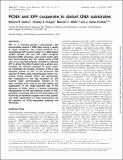PCNA and XPF cooperate to distort DNA substrates
Abstract
XPF is a structure-specific endonuclease that preferentially cleaves 3' DNA flaps during a variety of repair processes. The crystal structure of a crenarchaeal XPF protein bound to a DNA duplex yielded insights into how XPF might recognise branched DNA structures, and recent kinetic data have demonstrated that the sliding clamp PCNA acts as an essential cofactor, possibly by allowing XPF to distort the DNA structure into a proper conformation for efficient cleavage to occur. Here, we investigate the solution structure of the 3'-flap substrate bound to XPF in the presence and absence of PCNA using intramolecular Forster resonance energy transfer (FRET). We demonstrate that recognition of the flap substrate by XPF involves major conformational changes of the DNA, including a 90 degrees kink of the DNA duplex and organization of the single-stranded flap. In the presence of PCNA, there is a further substantial reorganization of the flap substrate bound to XPF, providing a structural basis for the observation that PCNA has an essential catalytic role in this system. The wider implications of these observations for the plethora of PCNA-dependent enzymes are discussed.
Citation
Hutton , R D , Craggs , T D , White , M F & Penedo , C 2010 , ' PCNA and XPF cooperate to distort DNA substrates ' , Nucleic Acids Research , vol. 38 , no. 5 , pp. 1664-1675 . https://doi.org/10.1093/nar/gkp1104
Publication
Nucleic Acids Research
Status
Peer reviewed
ISSN
0305-1048Type
Journal article
Collections
Items in the St Andrews Research Repository are protected by copyright, with all rights reserved, unless otherwise indicated.

